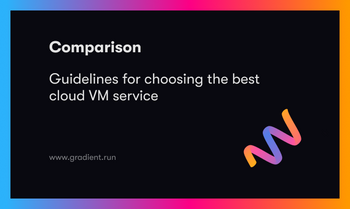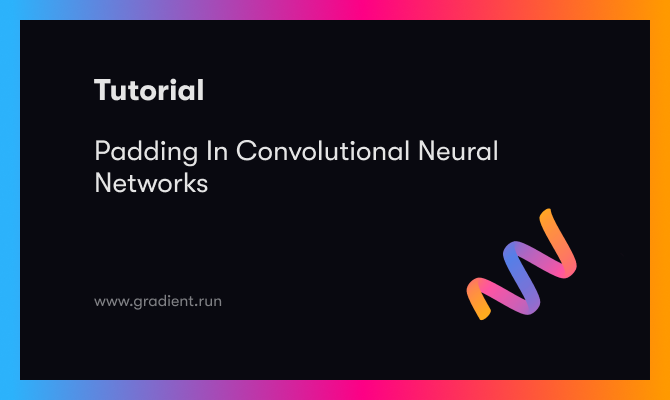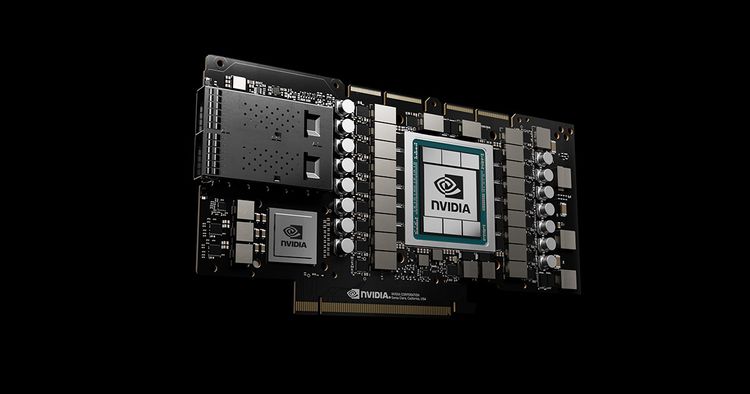Updated December 22, 2022
To clarify, upgrading to a team to a Pro or Growth plan will not enable each team member to access separate Free GPU Notebook Machines at any given time.
Updated July 11, 2022
We've updated this blog article with a bunch of new information about Google Colab and Paperspace Gradient. In particular, we added information about the Google Colab Pro+ plan as well as the Paperspace Gradient Pro and Gradient Growth plans. We also updated the free Gradient GPUs to include new free NVIDIA Ampere A4000, A5000, and A6000 machines.
Introduction
Google Colaboratory is probably the most popular hosted Jupyter notebook service in the world. Colab is an appealing choice for millions of users because it's free, requires only a Google account to access, and generally has decent speeds and availability.
Google Colab has a number of drawbacks however – especially when it comes to limitations on the free plan, limitations with GPU availability and performance, and limitations with Colab's version of a Jupyter notebook interface.
Colab's free GPU instances (most frequently K80 GPUs released in 2014) are underpowered. Connectivity can be unreliable as instances will disconnect frequently or can be pre-empted by other users during inactivity. And instances often do not come with enough RAM – particularly when working with larger datasets.
After releasing Google Colab publicly in 2017, Google released Colab Pro in early 2020 at the $9.99/mo price point to offer higher specs including faster GPUs, guaranteed runtimes and availability, and additional RAM.
Then in 2021, Google released Colab Pro+ which provides even higher specs at the $49.99/mo price point.
Colab Pro and Colab Pro+ solve a number of number of issues for machine learning engineers and data scientists – faster GPUs, longer sessions, fewer interrupts, terminal access, and additional RAM – however Colab Pro offerings are still limited in a number of ways:
- Colab Pro and Pro+ are unavailable to residents of all but a few countries
- Colab Pro and Pro+ limits GPU to NVIDIA P100 or T4
- Colab Pro limits RAM to 32 GB while Pro+ limits RAM to 52 GB
- Colab Pro and Pro+ limit sessions to 24 hours
- Colab Pro does not provide background execution, while Pro+ does
- Colab Pro and Pro+ do not offer a full version of JupyterLab
- Colab Pro and Pro+ do not guarantee resources so your instance may not be available
In this blogpost we're going to do our best to highlight the weaknesses of Google Colab Pro and Colab Pro+ and make the case for Paperspace Gradient as an alternative to Colab.
Our experience draws on years of success providing an alternative to Google Colab and Colab Pro plans called Paperspace Gradient to hundreds of thousands of machine learning engineers and data scientists.
Let's dive in!
Introducing Paperspace Gradient as an alternative to Colab Pro
Gradient Notebooks from Paperspace are an appealing alternative to Google Colab. Gradient Notebooks are trusted by hundreds of thousands of developers and data scientists from around the world and Gradient is one of the recommended cloud notebooks for the most popular deep learning course in the world – fast.ai.
Some of the features that Gradient Notebooks offer that Colab Pro and even Colab Pro+ do not include:
- Wider selection of GPUs including NVIDIA V100 and A100
- More RAM (up to 90 GB per instance)
- Full version of JupyterLab is always available
- More CPU (QTY 8 vCPUs compared to QTY 2 vCPUs for Google Colab Pro)
- Sessions are not interruptible / pre-emptible
- No inactivity penalty
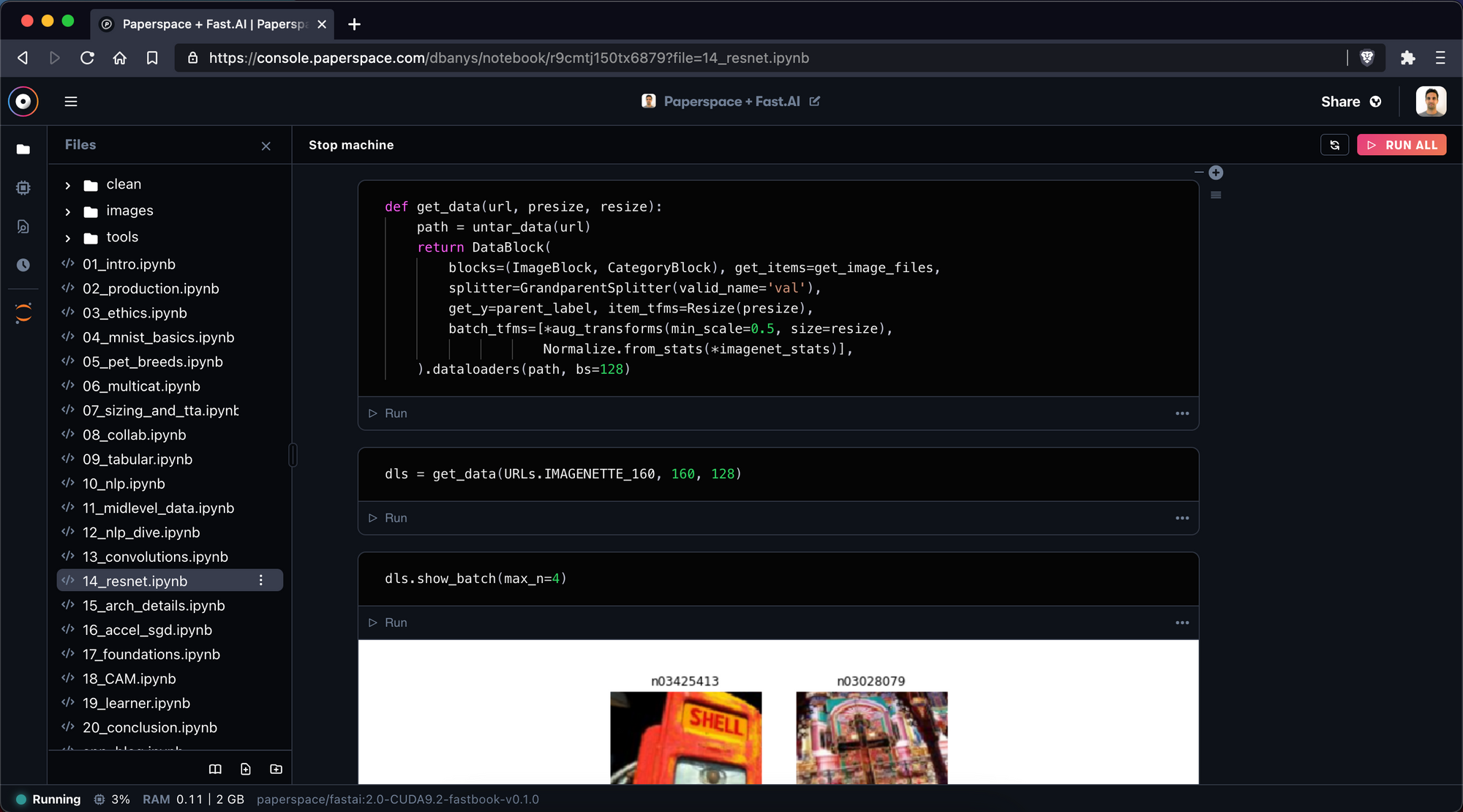
Let's get into some comparisons.
Pricing
Google Colab is free, Google Colab Pro is $9.99/mo, and Google Colab Pro+ is $49.99/mo.
Gradient has both free and paid tiers, which are delineated as follows:
| Gradient Subscription Type | Cost | Details |
|---|---|---|
| Free | $0/mo | - Free instances only - Notebooks are public - Limit 1 concurrent notebook - Limit 12 hours max per session - 5GB persistent storage - Free M4000 GPU |
| Pro (Individual) | $8/mo | - Free and Paid instances - Private notebooks - Limit 3 concurrent notebooks - Unlimited session length - 15GB persistent storage -Access to Free GPUs in Private Workspace - Free M4000 GPU - Free P4000 GPU - Free RTX4000 GPU - Free P5000 GPU - Free RTX5000 GPU - Free A4000 GPU |
| Pro (Team) | $12/mo | - Free and Paid instances - Private notebooks - Limit 3 concurrent notebooks - Unlimited session length - 15GB persistent storage -Access to Free GPUs in Private Workspace - Free M4000 GPU - Free P4000 GPU - Free RTX4000 GPU - Free P5000 GPU - Free RTX5000 GPU - Free A4000 GPU |
| Growth (Team) | $39/user/mo | - Free and Paid instances - Private notebooks - Limit 10 concurrent notebooks - Unlimited session length - 50GB persistent storage -Access to Free GPUs in Private Workspace - Free M4000 GPU - Free P4000 GPU - Free RTX4000 GPU - Free P5000 GPU - Free RTX5000 GPU - Free A4000 GPU - Free A5000 GPU - Free A6000 GPU |
Gradient instance pricing looks like this:
| Instance Type | Price per Hour |
|---|---|
| M4000 (free on all plans) | $0.45/hr |
| P4000 (free on Pro/Growth) | $0.51/hr |
| P5000 (free on Pro/Growth) | $0.78/hr |
| P6000 (free on Pro/Growth) | $1.10/hr |
| RTX4000 (free on Pro/Growth) | $0.56/hr |
| RTX5000 (free on Pro/Growth) | $0.82/hr |
| A4000 (free on Pro/Growth) | $0.76/hr |
| A5000 (free on Growth) | $1.38/hr |
| A6000 (free on Growth) | $1.89/hr |
| A100 (free on Growth) | $3.09/hr |
| V100 | $2.30/hr |
| A4000 x2 (only available on Growth) | $1.52/hr |
| A5000 x2 (only available on Growth) | $2.76/hr |
| A6000 x2 (only available on Growth) | $3.78/hr |
| A100 x2 (only available on Growth) | $6.18/hr |
System specs
For starters, let's take a look at the system specs of the instance types that you will get with Colab, Colab Pro, and Colab Pro+.
Most notable is that the majority of free Colab sessions will initialize with a K80 GPU and 12 GB of RAM.
| Feature | Google Colab | Google Colab Pro | Google Colab Pro+ |
|---|---|---|---|
| GPUs | Mostly K80 | K80, P100, T4 | P100, T4, V100 |
| CPUs | 2 x vCPU | 2 x vCPU | 2 x vCPU |
| RAM | Mostly 12GB | 32GB | 52GB |
| Guaranteed Resources | No | No | No |
| Price | Free | $9.99/month | $49.99/month |
Meanwhile, in Paperspace Gradient, GPU instances will always come with a minimum of 8 vCPUs and 30 GB RAM – even free instances!
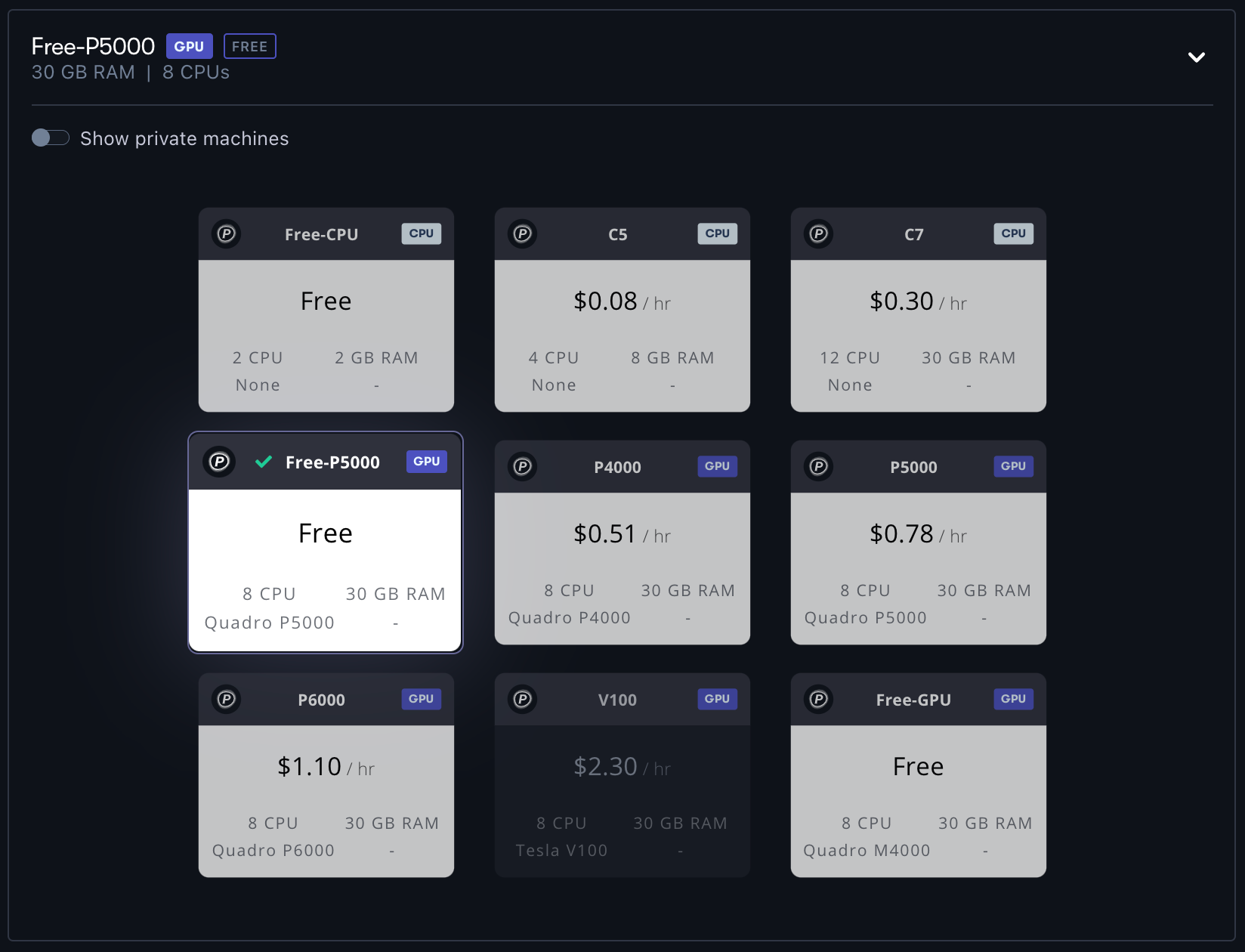
GPU instance comparison
When it comes to GPUs, neither Google Colab nor Colab Pro nor Colab Pro+ will let you select your GPU type. Instead, Google assigns you a GPU. This GPU is often a K80 (released in 2014) on Google Colab while Colab Pro will mostly provide T4 and P100 GPUs and Colab Pro+ will provide T4, P100, or V100 GPUs.
It can be frustrating never knowing which GPU will come up even on paid Colab Pro accounts. This causes a number of issues when with compatibility and reproducibility as each GPU can behave slightly differently.
GPUs available in Colab, Colab Pro, and Colab Pro+
| GPU | Price | Architecture | Launch Year | GPU RAM | CPUs | System RAM | Current Street Price (2022) |
|---|---|---|---|---|---|---|---|
| K80 | Free (Colab Free-tier) | Kepler | 2014 | 12 GB | 2 vCPU | 13 GB | $349 |
| T4 | $9.99/mo (Colab Pro) | Turing | 2018 | 16 GB | 2 vCPU | 13 GB upgradeable to 25 GB | $1,797 |
| P100 | $9.99/mo (Colab Free-tier and Colab Pro) | Pascal | 2016 | 16 GB | 2 vCPU | 13 GB upgradeable to 25 GB | $3,053 |
| V100 | $49.99/mo (Colab Pro+) | Volta | 2018 | 16 GB | 2 vCPU | Up to 52 GB RAM | $3,775 |
By comparison, Paperspace offers the most GPU types of any cloud GPU provider including a number of instances that are available for free on different plans.
GPUs available in Gradient Notebooks
| GPU | Price | Architecture | Launch Year | GPU RAM | CPUs | System RAM | Current Street Price (2022) |
|---|---|---|---|---|---|---|---|
| M4000 | Free (Gradient Free-tier) | Maxwell | 2015 | 8 GB | 8 vCPU | 30 GB | $433 |
| P4000 | $8/mo (Gradient Pro) | Pascal | 2017 | 8 GB | 8 vCPU | 30 GB | $859 |
| P5000 | $8/mo (Gradient Pro) | Pascal | 2016 | 16 GB | 8 vCPU | 30 GB | $1,795 |
| RTX4000 | $8/mo (Gradient Pro) | Turing | 2018 | 8 GB | 8 vCPU | 30 GB | $1,247 |
| RTX5000 | $8/mo (Gradient Pro) | Turing | 2018 | 16 GB | 8 vCPU | 30 GB | $2,649 |
| A4000 | $8/mo (Gradient Pro) | Ampere | 2021 | 16 GB | 8 vCPU | 45 GB | $1,099 |
| A5000 | $39/mo (Gradient Growth) | Ampere | 2021 | 24 GB | 8 vCPU | 45 GB | $2,516 |
| A6000 | $39/mo (Gradient Growth) | Ampere | 2020 | 48 GB | 8 vCPU | 45 GB | $4,599 |
RAM comparison
Free-tier Colab will almost always provide ~12 GB of RAM with limited access to high-memory VMs which have 25 GB RAM. Colab Pro increases availability of high-memory VMs (32 GB RAM), while Colab Pro+ extends high memory VMs to 52 GB RAM.
Alternatively, Paperspace ensures that all instances come with a minimum of 30 GB RAM. And Paperspace Gradient instances go up to 90 GB RAM in the case of the A100. Free GPUs go up to 45 GB RAM in the case of the A4000, A5000, and A6000.
| Google Colab | Google Colab Pro | Google Colab Pro+ | Gradient Notebooks |
|---|---|---|---|
| Mostly standard VMs with 12 GB RAM | Mostly high-memory VMs with 25 GB RAM | Up to 52 GB RAM | All instances have at least 30 GB RAM, often have 45 GB RAM, and go up to 90 GB RAM |
Resources Not Guaranteed
Neither Colab nor Colab Pro guarantee resources. This is mentioned several times in the Colab literature and is a large source of annoyance for many Colab users.
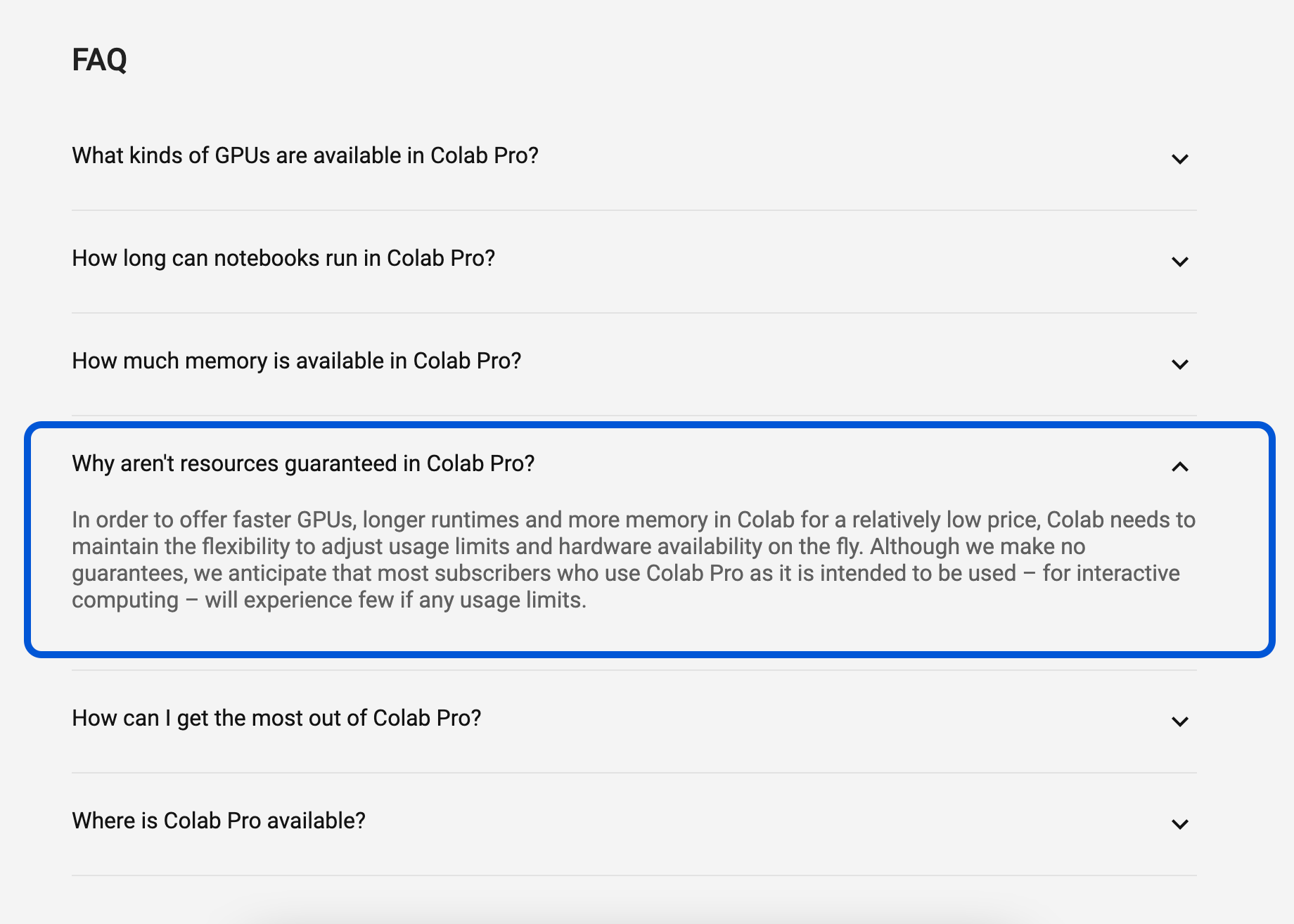
"Resources not guaranteed" means that Google can disconnect your instance at any time for any reason. And as many Colab users can attest – this seems to happen frequently!
We have heard countless stories of users being booted off a Colab instance for a couple minutes of inactivity, or for maxxing out resources, or for any number of seemingly arbitrary reasons. The frustration of being "pre-empted" even when you are paying for Colab Pro is real.
Paperspace on the other hand does not pre-empt your instances. Once you are running an instance your session will only end once the auto-shutdown limit is reached or you turn your instance off manually. If you are running a free instance, auto-shutdown will be set to 6 hours.
Time limitation comparison
To spell out a few of the time management differences between Colab, Colab Pro, and Gradient Notebooks, let's refer to this table:
| Google Colab | Google Colab Pro | Gradient Notebooks |
|---|---|---|
| 12 hours maximum session duration | 24 hours maximum session duration | No maximum session duration |
| Pre-empted after a few minutes of inactivity | Pre-empted after a few minutes of inactivity | Never pre-empted |
| No auto-shutdown | No auto-shutdown | Custom auto-shutdown intervals |
The biggest difference is that once you have secured an instance on Gradient, unlike with Colab, you will not be booted off the instance against your will.
Architecture and fundamental limitations of putting a wrapper on JupyterLab
Google Colab and Colab Pro are both limited implementations of JupyterLab – basically a thin wrapper around core Jupyter features. Colab and Colab Pro offer much of the same functionality as JupyterLab, but in an abbreviated package with far fewer options.
Gradient also offers a custom IDE which is a wrapper on top of JupyterLab. This IDE is designed to bring powerful Paperspace features into notebooks like instance selection, data management, and so forth.
But Gradient Notebooks also offer a full version of JupyterLab which is always available if you need it.
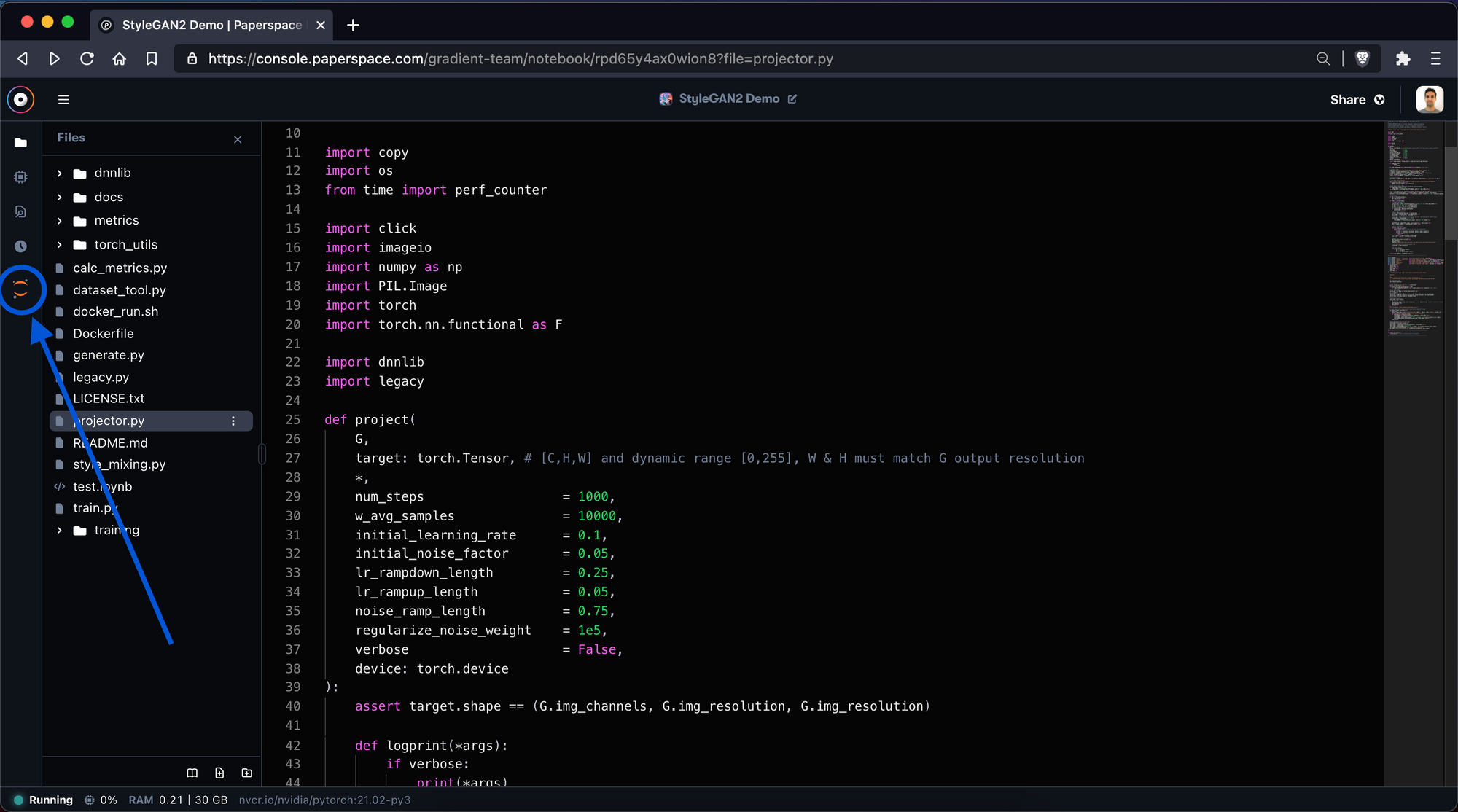
In this sense, Gradient Notebooks are not only comparable to Colab and Colab Pro in terms of simplicity, but also to much more fully featured JupyterLab experiences like Google's GCP AI Platform Notebooks, Microsoft's Azure ML Notebooks, or Amazon's AWS SageMaker Studio Notebooks.
Availability
When Colab Pro was introduced in 2020, an enormous pain point for many was regional availability. The original Colab Pro release countries were:
| Countries where Colab Pro was available initially |
|---|
| USA |
| Canada |
As of March 2021, Colab Pro has expanded availability to these countries:
| Countries where Colab Pro was recently made available |
|---|
| Japan |
| Brazil |
| Germany |
| France |
| India |
| United Kingdom |
| Thailand |
While it's a good sign that Colab Pro has recently opened to users in more countries, Colab Pro is still blocked in most countries on the planet.
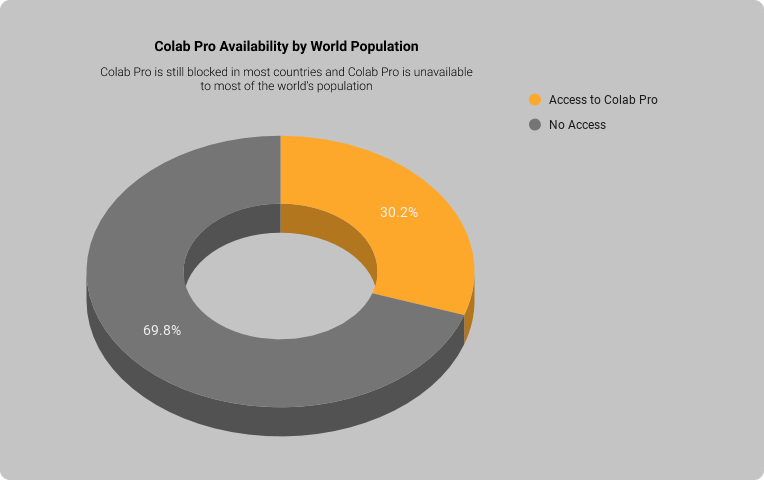
Meanwhile, Paperspace does not block access to users of any country. Paperspace currently has three data centers (US West, US East, and EU) with additional data centers planned for the future.
We also hear from many users that Paperspace instances are far more performant than Colab instances even if they are not located near a Paperspace data center!
Preloaded dependencies
Both Colab Pro and Gradient Notebooks come with a number of popular dependencies and libraries pre-installed. Colab Pro instances come with around ~380 pre-installed dependencies while Gradient Notebooks come with around ~220 pre-installed dependencies.
The biggest difference is that Colab notebooks come pre-loaded with a large number of Google-specific libraries and packages.
Support
No matter what kind of instance you're running on Paperspace – be it a free CPU instance, or a Free P5000 instance, or a beefy V100 paid instance – a friendly and helpful support team is always one message away.
At Paperspace our mean time to respond (MTTR) is just a couple of hours.
If you need support from Google for a Colab product – well, good luck with that!
Conclusion
If you're looking for an alternative to Colab Pro or Colab Pro+ that won't pre-empt you (interrupt your instances), won't degrade your instance arbitrarily, will provide you with more RAM, more CPUs (8 vCPUs compared to 2 vCPUs), a full JupyterLab experience, and will not block you based on your country – you might want to give Gradient Notebooks a shot.
Gradient Notebooks will always have a free-tier plan and will always be backed by a friendly team of engineers and machine learning enthusiasts who are working to make it easier to launch and run ML projects.



